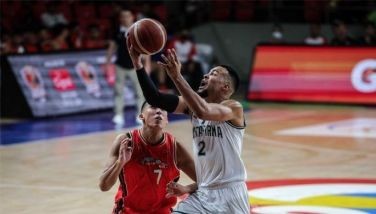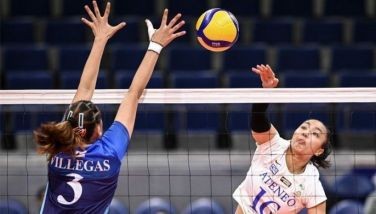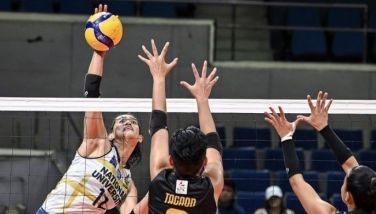Philippine volleyball on the move
NAKHONPATHOM, Thailand – We flew out of Manila the day after the highly successful PLDT Home Fibr Asian Men’s Club Volleyball Championships which ran from April 8 to 16 at the Mall of Asia Arena and the Cuneta Astrodome. The Islamic Republic of Iran topped the championship and thus earned the right to represent Asia in the World Club Championships in Brazil later this year. Qatar, which seemed to be well on the way to capturing the championship until its game collapsed in the second set, finished second and will also go to Brazil as a wild card entry.
The PLDT Home Fibr squad beat Lebanon to land seventh, its best-ever performance in the annual club championships. The event marked another milestone: it was the first time the Philippines hosted the Asian club championships after the country’s volleyball program remained in the doldrums and was inactive from the international volleyball scene.
Maundy Thursday, we, together with Ramon Suzara, chairman of the Asian Volleyball Confederation (AVC) marketing development committee and board member of the Philippine Volleyball Federation, were in Bangkok to attend the “17th Princess Cupâ€: The Chang 2014 Asian Women’s Club Championships that started a day earlier in this city of close to 900,000 people.
As proof of its support and to volleyball in particular, PLDT, through PLDT TVolution bankrolled the participation of the Philippine team to this 10-team tournament. The Philippine squad had the following for its members: Rachel Anne Daquis (team captain); Cuban Regla Maritza Bell Mackenzie (who played for her country’s national team in the Olympics in 1992 in Barcelona, 1996 in Atlanta, and 2000 in Sydney and three world championships); Misao Tanyama from Japan’s division II club competitions; Mary Jean Balse; Maria Angeli Tabaquero; Honey Rose Tubino; Jovelyn Gonzaga; Alyja Daphne Santiago; Arriane Mei Argarin; Suzanne Roces; Lizlee Ann Pantoni and Angelique Dionela. Rounding up the squad are Michelle Pauline Datuin and Michelle Laborte, reserves in the 12-woman lineup (with two reserves) as mandated by the FIVB, the world governing body for volleyball.
The coaching and team management staff had Sammy Acaylar as head coach, Rico de Guzman as assistant coach 1 and Emilio Reyes assistant coach 2. Edgar Barroza acted as team manager and was ably supported by Michael Carino (trainer); Dr Raul Alcantara (medical director); Alyssa Paula Tomas (physical therapist); Nestor Bello (international referee)l and Franklin Jara (team coordinator).
As of the writing of this column, the Philippines had won by straight sets over India (KSEB) and bowed to powerhouse China (Bohai Bank Tianjin); Chinese-Taipei (whose lineup included several national players); and the tall Kazakhstan (Zhetyssu) squads all by straight sets. The loss to Chinese-Taipei was particularly painful since the coaching staff and even Asian volleyball officials said that we could get the better of the Taiwanese were it not for the fact that the lady spikers were exhausted from the daily game schedule and still had to adjust to this international practice. It was a learning experience.
The other teams in the championships are: Iran (Martin Varamin); Japan (Hisamitsu Spring); Singapore (VAS); Thailand (Nakhonratchasima); and Vietnam (Thong Tin Lienvetpostbank). The winner of the tournament takes part in the Women’s Club World Volleyball Champions from May 7-11, 2014 in Zurich, Switzerland.
The re-entry of the Philippines in international volleyball competitions and the increased activity locally would not have been made possible without the support of PLDT through its head, sportsman-philanthropist, Manuel V, Pangilinan, who was ably backed by other PLDT executives like Chaye Cabral-Revilla, Gary Dujali and Gil Garcia, among others. Dujali and Garcia, and other PLDT staff, were in fact in this capital city of the province with the same name, which is an hour’s drive from Bangkok, to closely observe the conduct of the tournaments, to check the quality of the opposition and to support the entire team. A small but raucous group of Filipino expatriates showed up in each game to cheer the Filipinos.
The re-emergence of the Philippines internationally was of course welcomed by the Asian volleyball officials, among them, Mr. Somporn Chaibangyang, president of the Thailand Volleyball Association, host of the championships. Somporn was former governor of a Thai province and is now a private businessman with volleyball as one of his personal advocacies.
The Filipinos’ somewhat rapid improvement in volleyball, was noted by no less than Chinese-Taipei head coach Rampazzo Federico of Italy. Rampazzo was assistant coach of the Italian national volleyball team.
In Southeast Asia, we should be benchmarking ourselves with Thailand which has won 11 gold medals in SEA Games competitions, capturing the silver and bronze medals, only twice respectively in 15 stagings of the SEA Games. The Thais have gone no lower than sixth place in previous Asian Games competitions, a much tougher grind than the SEA Games. In the Asian Cup, they copped the bronze medal in 2008; silver in 2010 and eventually the gold in 2012.
The Thais are at the top of Southeast Asian women’s volleyball and eventually, the Vietnamese will follow suit. We could learn a thing or two from these two countries’ volleyball program.
- Latest
- Trending































